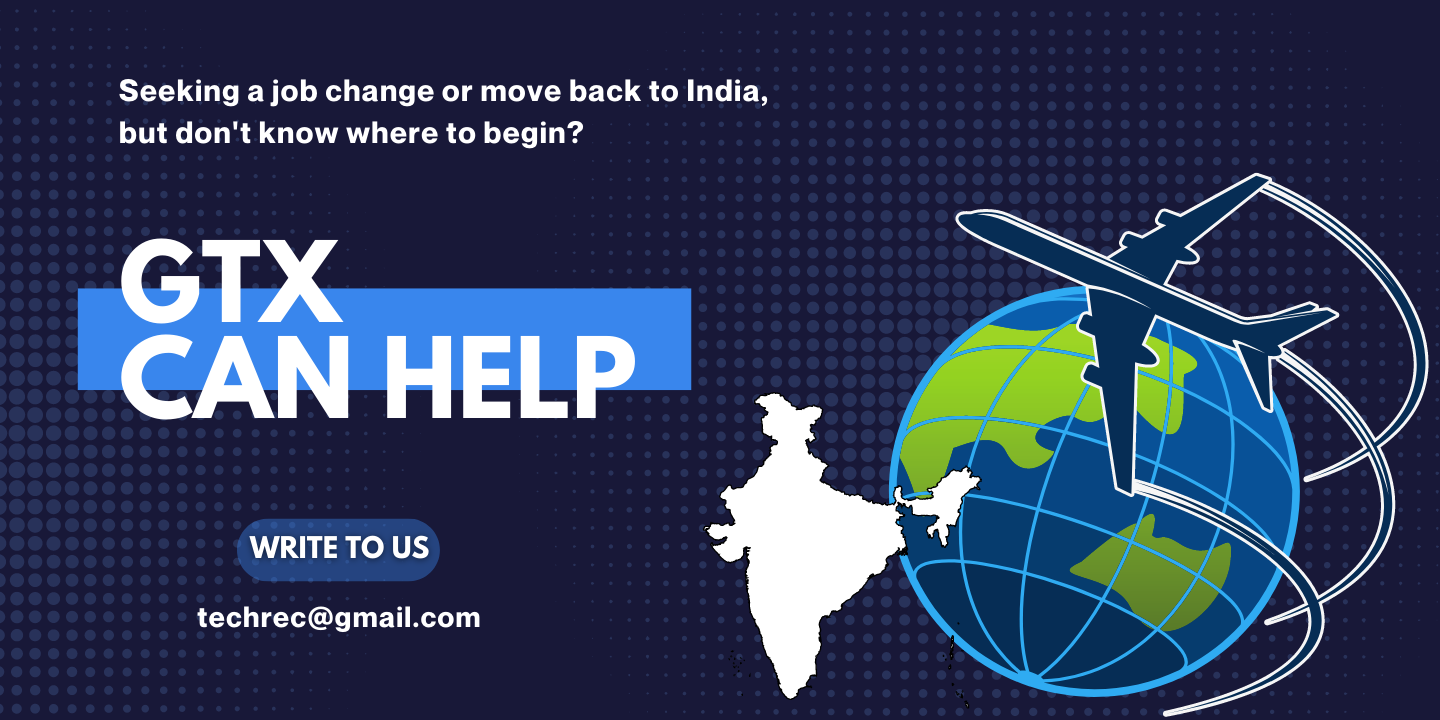Mrs. Khyati Thakur is currently working as a Senior Software Engineer at Inspirit.
She had moved to Los Angeles, USA, to pursue her Master’s in Computer Science, and had worked there for 9 years before moving back to India.
She has had a remarkable journey- personally and professionally. Khyati currently has over 10 years of experience working in the tech industry as a software engineer, engineering manager, and product manager and 7+ years of experience working as a K-12 curriculum creator. She has also worked as an educator in a non-profit in India.
The team at Global Talent Exchange got in touch with her recently, and she was gracious enough to tell us her story.
Khyati’s story is inspirational and conveys just how strong is the call of one’s motherland.
Read on!
Could you tell us a little bit about yourself?
I’m Khyati Thakur and I am currently living in Pune. I got my master’s degree from the University of Southern California (USC) and went on to work in the U.S. for a good 9 years as a software engineer. Over time, my husband and I realized we wanted to move back to India, and we’re here now!
A lot of your LinkedIn content revolves around your Return to India journey- could you elaborate on it?
When I first shifted to the US, I was sure that I wanted to come back and not settle there forever, as being close to my family is important to me. I met my husband at USC itself, and we both agreed that we would gain some experience in the US and then move to India. 2020 brought along the Covid pandemic, which delayed things for us. Finally, at the end of 2021, we decided to take the leap and relocate. I write about my journey to help others in a similar position take better decisions and understand how to go about the process.
What were the reasons that made you choose the US for higher education? How was life there- personally and professionally?
I think it was just because I was young and I wanted to explore how life would be in different countries. I was already working in India, and when I asked people how to accelerate my career to the next step, several recommended getting my masters from the US for exposure as well. The course content was great, I was working in a startup, and the work experience was good.
Though I was enjoying the way my life was shaping up, I always wanted to give back. When you’ve lived somewhere for so long, you are very connected to your roots, and family and you’re aware of the problems that exist. I even started working with non-profits in India while still in the US. I wanted to use my experience to build cool stuff for my people in India!
Apart from this, did you ever feel anything lacking in life while in the US?
Definitely. Of course, you can make some great friends in the US, and the colleagues are great, but nothing can even come close to the family and friends you have back home in India. It gets lonely very soon. It’s worse during festival time when you want to fly home with all your heart, but you can’t.
Covid was an extremely hard phase as well. Our parents got ill but we could not come back and take care of them due to the restrictions. It put things into perspective, and all the money that we were getting didn’t seem worth it any longer. The personal aspect overweighs the professional.
What was the “final trigger”? Why did you decide that this was the correct time to move back to India?
In my mind, I was ready to move way earlier than we actually did. Since at the time I was running my own startup, it was definitely easier for me to relocate. However, my husband was hesitant and wanted to explore more career opportunities before moving.
He did, in fact, land his dream job, but soon after, the work pressure increased massively. The question arose: What are we even doing this for, what is the purpose? We wanted to be close to our family and use our skills to help our country. This was the final trigger.
Would you say it can get difficult to find jobs across countries, and this search is what discourages NRIs from trying in the first place? What could make this process easier?
Certainly. It was difficult for me, for sure. After Covid, my startup started losing traction, and I was in the search of a job in India. When I was conducting a job search, I was certain about the fact that I needed to be compensated fairly.
India is booming right now, there are so many new startups that are solving real problems for the world. A majority of these companies are well funded and they are ready to pay handsome salaries because they want and need good talent. So, while it can be a little difficult to look for good jobs, it’s not impossible- you need to be patient and do your research. India is a silicon valley in the making- this is the place to be in right now.
What are some of the myths that would be debunked once NRIs return home? Do you think they still are envisioning an India that existed, perhaps, 10 years ago?
Most definitely- even I was holding on to such myths; the reality is very different. The job opportunities for sure to start with. I didn’t think it was possible to get such good salaries that are now possible. When we left India, the work culture was very different.
On a personal note, even the family scenario has changed. People are so much more liberal and there has been a major mindset shift and they are ready to accept new ideas- creativity is cherished! I thought I’m returning to the same old India, but that wasn’t the case. It’s not only our generation that has changed, even the older generation is more accepting and open-minded.
What message would you convey to other immigrants who might be considering a move back?
I would tell them about the career opportunities- there’s absolutely no shortage/limitation of them here. I would want to tell them that they can get paid just as much as they are in the US, but the interesting part is that they don’t need to. With just half of what they were getting paid in the US, they can lead an absolutely luxurious lifestyle in India. This is why even Silicon Valley VCs are looking for opportunities here and investing in the businesses.
On the personal front, I want to tell them that they will never be able to develop the kind of connections and relationships as they have in India. I understand it’s difficult to take the plunge, but it is so worth it.
Immigrants gain a lot of good exposure while working in the US. In what ways do you think they can leverage their experience to secure leading positions in India, and use their savings to lead a comfortable life?
NRIs can manage to save a lot of money. From my own experience, my husband and I were earning for just about 7 years, but when we moved back to India, we didn’t have to worry about finding work immediately. The amount that we saved was more than enough to sustain us for about 6-10 years even. We could sit back a bit and discover what we wanted to do further- such downtime is practically impossible in the US. Then again, the exposure you’ve gained can be utilized within the country as several companies would be willing to offer a lucrative salary for your expertise.
Once you finally moved back, how easy or difficult was it to settle down? Is that a major point of concern?
I would say it takes time to settle down. The weather could take you aback at first- India is a relatively hot country, but there are places with a cool environment as well. Also, the air quality and pollution could pose an issue, but this is where you came from and it doesn’t take extremely long for your body to adjust.
I think there are pros and cons to living in each country- you just have to prioritize. If you’re moving back to be close to your family and reconnect with your homeland, such problems hardly matter. Moreover, the food in India is so very fresh- be it vegetables, fruits, or milk. For example, in the US, we would get a massive 4-gallon jar of milk that would stay in our refrigerator for up to 2-3 weeks, which is extremely unhealthy. Here in India, we get fresh milk at our doorstep daily.
Global Talent Exchange is a new-gen recruitment platform that specializes in helping NRI talent access top-notch career opportunities back in India that are in alignment with their experience and current pay.
Do you think if you’d been in contact with GTX during your own move, it would have eased the process and made the job search easier?
Definitely, it would have helped me massively. What GTX is doing is the need of the hour. Since I started writing my story on LinkedIn I’ve noticed several immigrants reaching out to me because they want to know what my experience was like and because they want to move back as well. Thus, I think this initiative is right on time.
If I had gone through GTX, it would have saved me a good 3-4 months and I wouldn’t have scrambled with finding the right opportunities.






